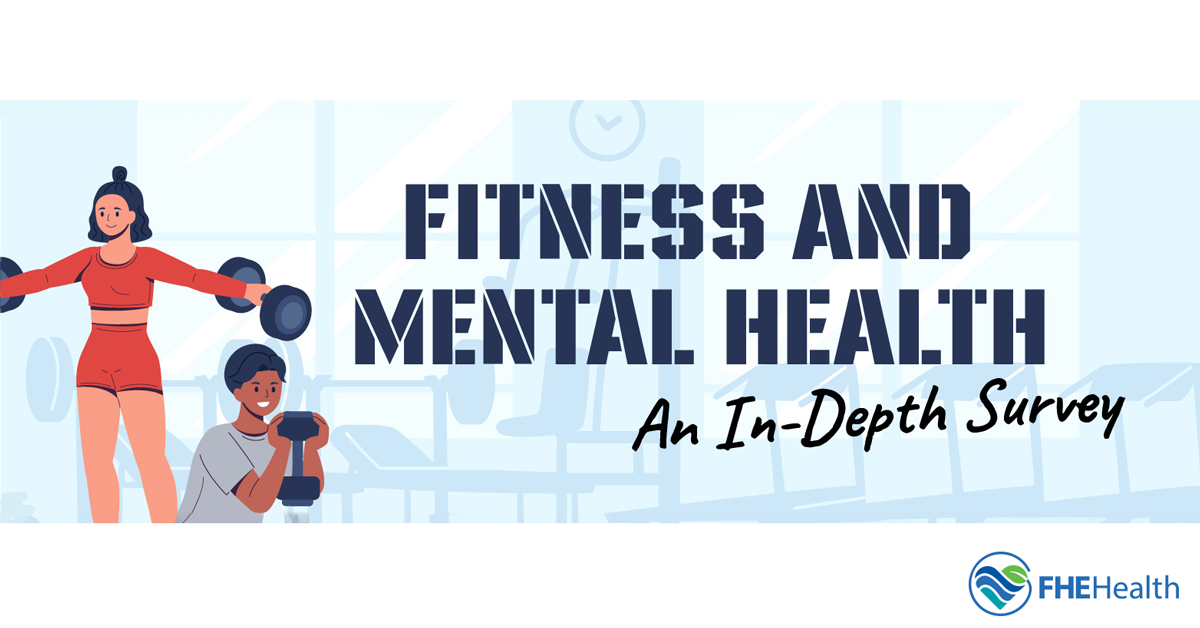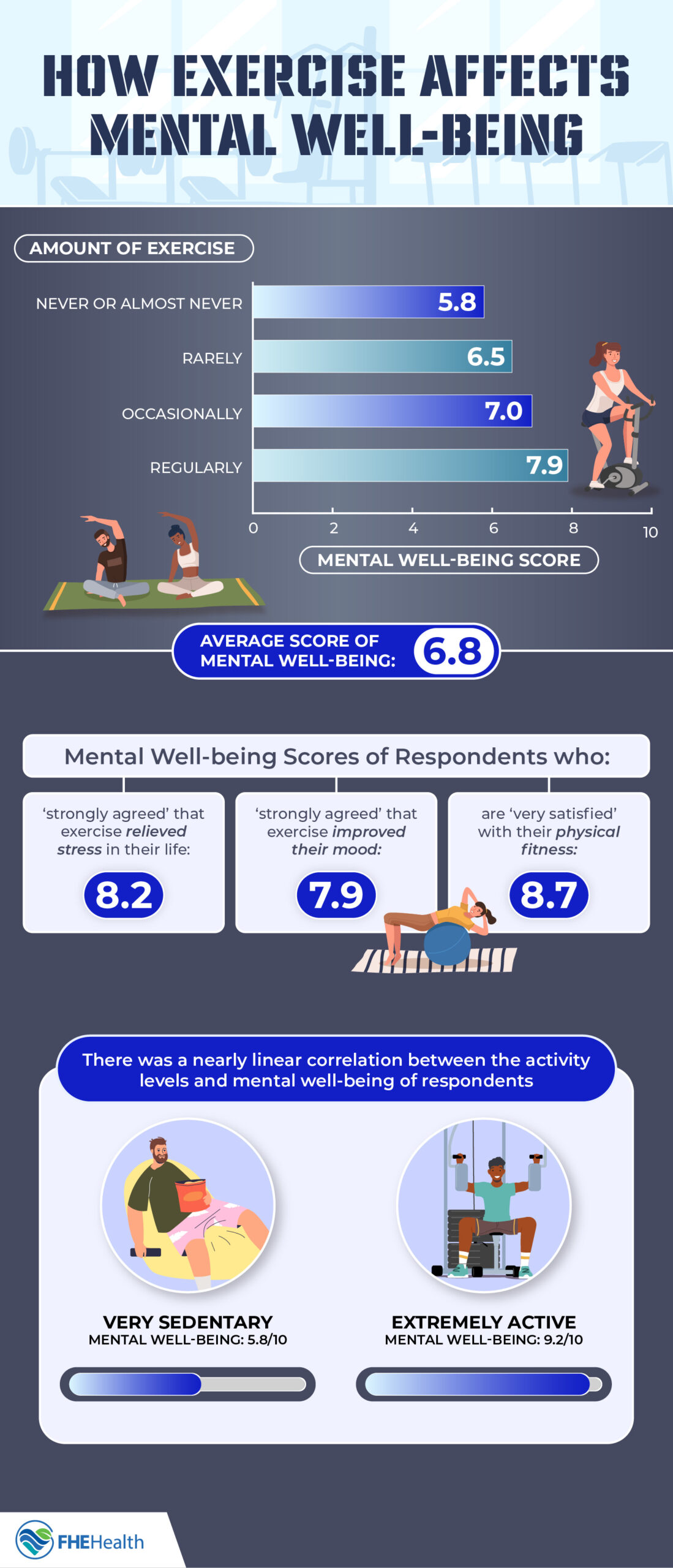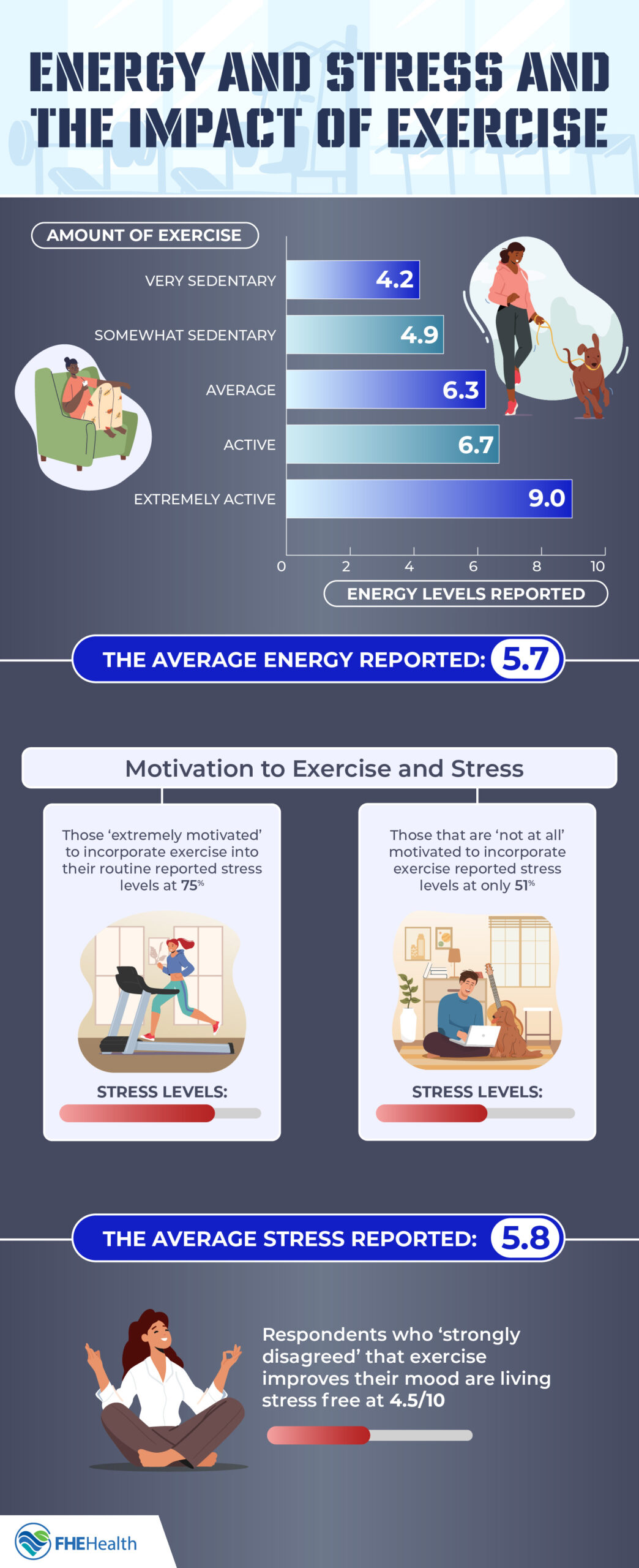
There’s a lot of information on the impact exercise has on our physical health, with studies showing that it decreases the risk of developing certain diseases, helps individuals manage their weight, and improves bone and muscle strength. On top of all this, researchers find that regular exercise supports brain health, reducing the symptoms of conditions such as anxiety and promoting thinking and learning skills.
We wanted to explore the impact exercise has on the factors that contribute to mental health, including energy levels, stress and overall mental well-being. To do that, we conducted a fitness and mental health survey.
Opinions on Exercise and How People Exercise
Through our survey, we wanted to get insight into how our participants felt about exercise in general. Did their beliefs about exercise influence their own habits? How do participants feel about their daily fitness regimens? Is there a correlation between how often a person exercises and how they feel about their level of physical fitness?
How Do People Feel About Exercise?
Overall, our respondents felt that exercise has a strong impact on their moods and sense of well-being. In fact, 71 percent of people “agreed” or “strongly agreed” that regular exercise has a positive impact on their mental health, and 70 percent of people “agreed” or “strongly agreed” that exercise helps to improve their mood.
Not all motivation to exercise came from a desire to improve mental health, however. For a little over 40 percent of people, societal pressure has a significant impact on whether or how often they exercise.
In all, only 35 percent of people who participated in our study reported that they were satisfied with how much exercise they currently get. Others expressed little desire to change their current routine, with 31 percent of people feeling “not at all” or only “slightly” motivated to introduce exercise into their lifestyle.
How Often Do People Exercise?
Despite the widespread belief that exercise positively affects our mental health, most people don’t incorporate physical activity into their daily routines. Nearly half of our respondents (48.7 percent) reported that they never exercise or only get a workout in once or twice per week. When we asked respondents about how active their lifestyle was, 54 percent reported a “very sedentary” or “somewhat sedentary” day-to-day life. Less than a quarter of respondents (23 percent) said that they had an active or extremely active lifestyle.
Are People Content with Their Exercise Habits?
In addition to learning about our participants’ exercise habits, we wanted to find out how they perceived their level of physical activity. To that end, we asked questions about how satisfied they were with how often they worked out as well as their level of physical fitness.
Unsurprisingly, about seven out of 10 people who reported that they never or almost never exercised said that they were “very” or “somewhat” dissatisfied with their level of physical fitness. Similarly, those who described their lifestyle as sedentary also reported low levels of satisfaction, with 67 percent of people in this category indicating dissatisfaction.
On the other hand, an active lifestyle and a consistent exercise regimen correlated with high levels of satisfaction. 81 percent of those who exercised regularly, getting in five or more workouts each week, reported that they were satisfied or very satisfied with their level of physical fitness. A staggering 96 percent of people who self-reported an “extremely active” lifestyle also expressed high levels of satisfaction.
We also wanted to find out if those who exercised regularly were as likely to report symptoms of depression as those who have a sedentary lifestyle or lack a consistent exercise routine. However, in our survey, we didn’t see a strong correlation between how often someone exercised versus how often they experienced depression.
How Exercise Affects Mental Well-Being
When we shift our focus to how exercise affects an individual’s well-being, we found some noteworthy trends related to how participants feel about their stress levels and general moods. Altogether, on a 10-point scale, the people in our survey reported an average mental well-being score of 6.8. However, we found that the score varied consistently depending on how often they worked out.
How a Person’s Exercise Regimen Affects Their Well-Being
In our survey, we found a direct correlation between how often a person works out versus their mental health score. For example, those who never or almost never exercise rated their mental well-being at an average of 5.8, a full point below the norm. Those who rarely exercise rated their well-being at 6.5. While this is still a little below the overall average, it’s notably higher than the rating for those who neglect exercise altogether.
Those who exercise more consistently rate their mental well-being even higher on our scale. Among those who reported exercising occasionally, the average score was 7.0, slightly above the overall norm. The respondents who reported that they exercise regularly rated their mental well-being the highest at 7.9, more than a point above the overall average.
How Other Indicators Affected Mental Well-Being
To get a better idea of the relationship between exercise and mental well-being, we looked at how different groups measured the impact of physical activity on their mental health. Again, on average, participants rated their mental well-being at 6.8.
Here are some of our key findings:
- Those who exercise regularly, or at least five times per week, reported a mental well-being score of 7.9
- Participants who “strongly agreed” that exercise positively impacts mental health rated their well-being at an average of 8.5, two points above the overall average
- Those who “strongly agreed” that exercise provides benefits for their mood rated their mental well-being at 7.95
- On average, those who reported that they are “very satisfied” with their level of physical fitness rated their well-being at 8.71
- We found an almost linear correlation between someone’s reported activity level and how they rate their mental well-being; scores ranged consistently from 5.86 for those who are “very sedentary” up to 9.2 for those who are “extremely active”
- Those who were “extremely motivated” to incorporate exercise into their daily routine reaped some of the biggest benefits to their mental well-being, reporting an overall score of 8.46
Additional Factors
Obviously, unrelated factors can have a strong impact on how someone perceives their mental well-being. We recognize that those who have more access to financial resources may have more opportunities to exercise, whether that means purchasing a gym membership, furnishing a home gym, or enjoying enough leisure time to commit to a fitness regimen. On the other hand, people who have more limited access to financial resources may not have these same opportunities.
To control for this, we gave participants the opportunity to self-report their household income, letting us spot trends in mental health across different income brackets. In general, the results were what we expected, with most groups reporting well-being scores within a point the 6.8 average. However, there were two exceptions. Those who reported an annual household income of $50,000-$75,000 reported a lower well-being score of 5.77. On the other hand, those with household incomes falling between $150,000 and $175,000 reported a much higher score of 9.05.
We also wanted to find out whether weight loss goals played a part in how respondents believed exercise affected their mental well-being. Surprisingly, survey results indicated that participants’ weight loss goals – whether or not they had any – didn’t have a strong connection with how they rated their mental well-being.
Finally, we wanted to establish whether there was a relationship between mental well-being and energy levels. To do that, we asked participants to rate their daily energy levels on a 10-point scale, with 10 being the highest energy level. We discovered a direct correlation between a person’s well-being and their energy level. Those who rated their mental well-being at 3.63 rated their energy level at or around 0.
On the flip side, those who rated their mental well-being at 9.68 reported an optimal average energy level of 10. While many participants may have preferred to express their energy levels using extremes, these results demonstrate a clear connection between a person’s well-being and how much energy they have throughout the day.
Energy and Stress and the Impact of Exercise
Is exercise an effective way to boost your energy level or manage stress? In addition to measuring exercise’s impact on survey participants’ well-being, we wanted to find out whether their exercise habits had any affect on other aspects of mental health. To do this, we had participants rate their energy and stress levels on 10-point scale.
Exercise and Energy Levels
On average, participants in our survey rated their energy levels at 5.91. Unsurprisingly, the more active a person was, the higher they rated their energy levels.
- Those who had the lowest levels of daily activity and described their lifestyle as “very sedentary” rated their energy level at 4.18 on average
- Those who reported “somewhat sedentary” lifestyles rated their energy levels at 4.93
- Participants who consider their level of activity to be average rated their energy levels at 6.25, a little higher than the overall average
- Individuals who rated their lifestyles as “active” reported a typical energy level score of 6.67
- Those who reported “extremely active” lifestyles scored their energy levels at 8.96, over three points above the overall average
More unexpectedly, when we looked at participants’ ages, we found that older participants rated their energy levels higher than younger participants. On average, those aged 18-29 rated their energy levels at 5.27, about half a point lower than the overall norm. However, those aged 60 and over scored their energy levels at 5.91, a little higher than the average.
Exercise and Stress Levels
Overall, survey respondents rated their stress levels at 5.8. We found that those who report that they’re “extremely motivated” to incorporate exercise into their routines reported higher-than-average stress levels of 7.4. When we asked if exercise relieves stress, the group that reports the highest level of stress indicated that they “strongly agreed” that physical activity helped them manage their stress.
On the other hand, those who report that they are “not at all” motivated to incorporate exercise into their routines reported lower stress levels. On average, this group rated their stress at 5.1. Additionally, participants who reported the lowest stress levels (4.78) indicated a neutral response when we asked if exercise reduces stress.
In addition to this, we found that the group feels strong societal pressures to exercise rank as the most stressed, reporting a level of 7.0. Those who strongly disagree with the statement that exercise improves their mood report the lowest levels of stress, indicating a score of 4.5.
Conclusion
While we tried to ensure the accuracy of our survey, its format creates some limitations that may affect the results. We have taken steps to eliminate inauthentic respondents, but there may still be some inaccurate feedback impacting the overall picture of how exercise impacts mental well-being.
First, the survey doesn’t give us insight into whether someone has the desire and motivation to exercise but is unable to do so because of their environment or their physical limitations. Second, because it’s a poll, there’s a risk of participants rushing through or skipping answers, skewing the overall accuracy as well as resulting in false connections between exercise and mental health factors. Lastly, some respondents may have picked similar answers for all questions. For example, they may have provided similar ratings to reflect their stress, energy and mental well-being levels rather than considering each element separately.
Methodology
We surveyed 315 people. Our respondents chose to participate in the survey and this survey was open for all demographics to take. Our respondents are exclusively from the United States. We utilized SurveyMonkey’s Audiences services to source respondents. Respondents are not reimbursed for taking the survey, but survey completion awards a donation to a cause of the recipients choice.
Fair Use
Want to use our study? Please feel free! All that we ask is that you include a link back to this page so readers can learn more about the study.









